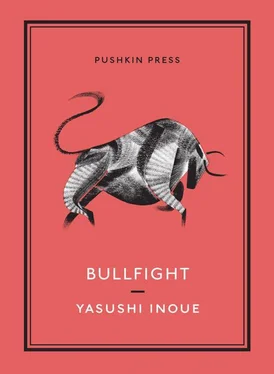Yasushi Inoue - Bullfight
Здесь есть возможность читать онлайн «Yasushi Inoue - Bullfight» весь текст электронной книги совершенно бесплатно (целиком полную версию без сокращений). В некоторых случаях можно слушать аудио, скачать через торрент в формате fb2 и присутствует краткое содержание. Год выпуска: 2013, Издательство: Pushkin Collection, Жанр: Классическая проза, на английском языке. Описание произведения, (предисловие) а так же отзывы посетителей доступны на портале библиотеки ЛибКат.
- Название:Bullfight
- Автор:
- Издательство:Pushkin Collection
- Жанр:
- Год:2013
- ISBN:нет данных
- Рейтинг книги:4 / 5. Голосов: 1
-
Избранное:Добавить в избранное
- Отзывы:
-
Ваша оценка:
- 80
- 1
- 2
- 3
- 4
- 5
Bullfight: краткое содержание, описание и аннотация
Предлагаем к чтению аннотацию, описание, краткое содержание или предисловие (зависит от того, что написал сам автор книги «Bullfight»). Если вы не нашли необходимую информацию о книге — напишите в комментариях, мы постараемся отыскать её.
Bullfight Bullfight
The Hunting Gun
The Counterfeiter
Contains a previously unpublished preface by Inoue himself.
Bullfight — читать онлайн бесплатно полную книгу (весь текст) целиком
Ниже представлен текст книги, разбитый по страницам. Система сохранения места последней прочитанной страницы, позволяет с удобством читать онлайн бесплатно книгу «Bullfight», без необходимости каждый раз заново искать на чём Вы остановились. Поставьте закладку, и сможете в любой момент перейти на страницу, на которой закончили чтение.
Интервал:
Закладка:
*
The bullfighting tournament was only ten days away, and both the front and second pages of the Osaka New Evening Post were now covered with articles relating to it. This was one of the advantages of being a small evening paper — a more prominent newspaper could not easily have set aside space to publicize one of its own enterprises, while the New Evening Post could eliminate all the news it wanted, as long as it wasn’t too significant, replacing each article with publicity. They used photos of bulls’ heads in the picture box that went with the editorial, and bullfighting made an appearance in a popular comic strip they serialized. Tsugami kept hearing that the sarcastic fellows over at B. News had been mocking him, saying he had started putting out a cowspaper, but he and Omoto acted as if they hadn’t heard a thing — they would go on publishing their cowspaper right up to the day of the tournament, no matter what anyone said. No sooner had they published the prize-winning Bullfighting Tournament Theme Song than they ran an announcement soliciting fighting names for the twenty-two bulls who would participate in the great event. The same day, a young reporter proposed that they let people vote on which bull they expected to win — a plan the reporter himself worried might be a bit too much, but which Tsugami instantly approved. At times like these, Tsugami would sit briefly with his cigarette dangling from his mouth, a far-off, unfocused look in his eyes, and then all of a sudden, so quickly it was hard to see how he could have had time to think, he would issue his decision in a somewhat shrill tone. He gave the impression less that he had thought things through than that he had been struck by an almost divine inspiration. As the tournament approached and the number of little tasks he had to take care of kept increasing, he grew progressively less talkative and more active.
At the same time all this was going on, a rather flashy advertising campaign was unfolding in other venues, apart from the paper itself, largely as a result of the young reporter T.’s efforts. Large, well-placed posters depicting two bulls locking horns caught the gazes of the crowds gathered in the bus terminals and subway stations of Umeda, Naniwa, Ueroku. Small posters with the exact same design hung in every bus and in every car of every suburban train. Once they had held a ceremony to introduce the Bullfighting Tournament Theme Song at a certain theater in Shinsaibashi, they started sending the sound trucks around to the now colder-than-ever shantytowns, the song blaring from the microphones on their roofs. Day after day, three trucks drove around Osaka and two around Kobe, each stocked with a supply of dancing girls.
The expenses associated with these activities greatly exceeded expectations, and, when the costs of building the ring and the stable were added, the financial burden was considerably heavier than the Osaka New Evening Post could bear. The accountants were the first to raise the alarm. They drastically reduced allowable expenses for travel, parties, and miscellaneous costs, and ended the almost openly acknowledged system of payday loans, tolerated in silence by the higher-ups as a temporary means of alleviating the penury of the paper’s employees. They even announced that payment of the night-shift allowance, normally distributed on the 15th, would be delayed until the end of the month. When the notice announcing this was posted on the bulletin board, the chief of the accounting department came to see Tsugami and drive home in a rather painful way how serious this was.
“Mr. Tsugami, I can’t have you spending any more on this, I really can’t. Many of our employees rely on the night-shift allowance.”
Three days before the tournament, Tsugami received a telegraph from Tashiro that read: “SIX A.M. TOMORROW BULLS ARRIVE NISHINOMIYA.” The stable where the twenty-two bulls would be kept was ready, having been built in a barren area across from Nishinomiya Station; the hundred-plus people who had been brought into town, including the bulls’ owners and handlers, had all been assigned to lodges and inns in Nishinomiya that had survived the firebombings. That night, Omoto and Tsugami clinked whiskey glasses at a bar on Umeda Shinmichi frequented by Omoto.
“Well,” Tsugami said, “at least we know the bulls will be here.”
Relief showed on both men’s faces.
“Tell me about it. Imagine if the train had gone missing or something — boy, would we have been screwed. I have to say, though, it sure cost a lot to get to this point.”
Tsugami sensed a note of reproach in Omoto’s voice, but he pretended he hadn’t. “They say these days any project will cost five times what you think it will. We’ll have done pretty well if we come out of this just three times over budget, I’d say.”
“And we ought to be done with the big expenditures, now that we’ve come this far.”
“I think so. Even if we do need more money, we’ll figure something out.”
“Spoken like a true reporter. Coming up with one or two hundred thousand yen isn’t actually all that easy, you know.”
Tsugami caught himself just as he was about to comment that if worst came to worst, Omoto had enough, didn’t he? He restrained his irony and instead said quietly, “Five days from now, we’ll have a million extra yen pouring in.”
They were banking on an audience of thirty thousand each day, yielding a three-day total of about a hundred thousand. There would be five thousand fifty-yen ringside tickets, twenty thousand forty-yen infield tickets, and seventy-five thousand rear infield and outfield tickets that would go for thirty yen each. Total sales should come out to three million three hundred thousand yen; subtract a million for expenses and you were left with two million three hundred thousand in pure profit. After splitting the profits with Tashiro, the paper would take in about a million. That, at any rate, was how Tsugami had calculated it.
Omoto had a reputation both inside and outside the company as a generous, reckless manager, in contrast to Tsugami, who was known for keeping a tight rein on everything; somewhere along the way, though, the two men had swapped roles. They themselves saw this most clearly. Tsugami had noticed the unexpectedly nervy, calculating core concealed within Omoto’s seemingly openhanded, nonchalant manner; Omoto, with all his years of experience taking stock of people, had noted with a certain unease that underneath his stern outer shell, this young reporter, reputed to be so sharp, so clearly fastidious, even picky, harbored a tendency to wallow half-wittedly in his desires that made it unwise to trust him too far.
*
The next morning Tsugami took the first train on the government line to Sannomiya Station, only to discover that the freight train had arrived at dawn, around four, about two hours earlier than Tashiro had expected, and the whole party was milling about in one corner of the train yard. The twenty-two magnificent bulls, each of which must have weighed over seven hundred and fifty kilograms, stood with their handlers, tied to the station’s wooden fence, steam rising from their bodies. Tashiro, who had been with a group of men surrounding a bonfire near the freight house, strode over looking cold, chin tucked into his leather overcoat. As he approached, he jubilantly cried out, “Ah, Mr. Tsugami! What do you think?” He nodded toward the bulls. “Splendid, aren’t they! They’re not like these cows in Kobe and Osaka, fed on leftovers.”
Standing there with a cigarette in his mouth, not bothering to say good morning or even to take his hands out of his pockets, Tashiro had the unmistakable air of a showman, elated at his success.
“Rough morning, I bet.”
“Actually no, the ride was surprisingly relaxing — having the whole train to ourselves made things easy. Sure took a long time, though, one night here, next night somewhere else. Five days, including today. I’m exhausted, let me tell you.”
Читать дальшеИнтервал:
Закладка:
Похожие книги на «Bullfight»
Представляем Вашему вниманию похожие книги на «Bullfight» списком для выбора. Мы отобрали схожую по названию и смыслу литературу в надежде предоставить читателям больше вариантов отыскать новые, интересные, ещё непрочитанные произведения.
Обсуждение, отзывы о книге «Bullfight» и просто собственные мнения читателей. Оставьте ваши комментарии, напишите, что Вы думаете о произведении, его смысле или главных героях. Укажите что конкретно понравилось, а что нет, и почему Вы так считаете.












